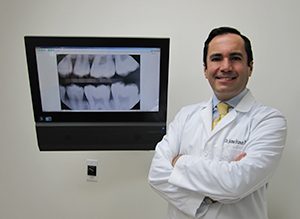Degenerative Joint Disease Jaw Treatment in North Miami Beach, FL
Put an End to Painful DJD Symptoms
Did you know the chronic degenerative disease can cause the cartilage that cushions the joint to break down, leading to bone-on-bone contact and inflammation in affected joints?
If you’re dealing with TMJ problems, contact our dentist in North Miami Beach, FL today at (305) 945-0909 to schedule your consultation. We’ll evaluate your health and develop a treatment plan to relieve pain and get you on the track to better days.
What is Degenerative Joint Disease (DJD) in the Temporomandibular Joint?
Degenerative joint disease (DJD), also known as osteoarthritis, occurs when the protective cartilage in a joint breaks down. Temporomandibular joint osteoarthritis (TMJ OA) is a specific type of DJD affecting the TMJ, characterized by chronic degeneration of cartilage and subchondral bone. In the temporomandibular joint (TMJ), DJD can lead to pain, stiffness, and limited jaw mobility.
Causes of DJD in the TMJ
- Aging: As we age, the cartilage in our joints naturally deteriorates, which can contribute to DJD.
- Joint Injury: Trauma to the jaw, such as a dislocation or fracture, can increase the risk of developing DJD.
- Jaw Overuse: Excessive jaw movements, such as chewing gum or clenching teeth, can put added stress on the TMJ and accelerate the breakdown of cartilage.
- Genetics: Some people may have a genetic predisposition to DJD.
- Secondary Degenerative Arthritis: This condition can develop as a result of other health issues, particularly temporomandibular joint (TMJ) disorders. Factors such as trauma, jaw clenching, and untreated TMJ disorders can contribute to its development, and it is notably more prevalent in women.
Symptoms of DJD in the TMJ
- Pain: Aching or throbbing pain in the jaw, face, or neck.
- Stiffness: Difficulty opening or closing the mouth, especially in the morning.
- Limited Range of Motion: Restricted jaw movement, making it difficult to chew or speak clearly.
- Clicking or Popping Sounds: Audible noises when moving the jaw.
- Headaches: Frequent or severe headaches.
- Earaches: Pain or discomfort in the ear.
- Facial Muscle Fatigue: Tiredness or discomfort in the facial muscles.
- Facial Pain: Significant symptom of DJD in the TMJ, often associated with jaw muscle issues and related symptoms.
Treatment Options for DJD: Physical Therapy and More
- Medications: Over-the-counter pain relievers like ibuprofen or acetaminophen can help manage symptoms. In some cases, prescription medications such as muscle relaxants or corticosteroids may be recommended. It is crucial to manage arthritis affecting TMJ with appropriate medications to alleviate pain and improve joint function.
- Physical Therapy: A physical therapist can provide exercises and stretches to strengthen the jaw muscles and improve mobility.
- Splints or Oral Appliances: Wearing a splint or mouthguard can help reduce stress on the TMJ and prevent further damage.
- Surgery: In severe cases, surgical procedures may be necessary to alleviate pain and restore jaw function. This could include arthroscopy (a minimally invasive procedure) or joint replacement surgery.
Frequently Asked Questions
Can DJD be prevented?
While there is no guarantee of preventing DJD, maintaining a healthy weight, practicing good posture, avoiding excessive jaw movements, and wearing a mouthguard during high-impact activities can reduce the risk. Additionally, managing underlying conditions like rheumatoid arthritis, which can affect the temporomandibular joint (TMJ), can help reduce the risk of developing DJD.
Is DJD common?
Yes, it’s a relatively common condition, especially in older adults. Many people experience some degree of DJD in their joints as they age. Additionally, TMJ disorders are prevalent among the general population, often leading to symptoms like jaw pain and clicking, and can result in long-term complications such as arthritis if left untreated.
Can I still eat normally with DJD?
Depending on the severity of your DJD, you may have difficulty eating certain foods. Chewing can be painful or difficult for some people with DJD. Your dentist can recommend strategies to help you eat more comfortably. Additionally, the alignment of your upper and lower teeth can impact your ability to eat comfortably, as misalignment may indicate potential issues related to jaw discomfort.
Find Relief for DJD and Jaw Pain Symptoms
If you’re experiencing jaw pain, stiffness, or limited mobility, see a doctor or dentist for an evaluation. Issues affecting the jaw joint, such as temporomandibular disorders (TMD), can lead to significant discomfort and should be addressed promptly. Degenerative joint disease can be a chronic and debilitating condition, but with proper treatment and management, you can improve your quality of life and reduce your symptoms.
Call our North Miami Beach office at (305) 945-0909 to schedule a consultation with Dr. Abbo and Dr. Gallego. You can also reach out through our website, where you’ll be put in contact with a helpful staff member.

